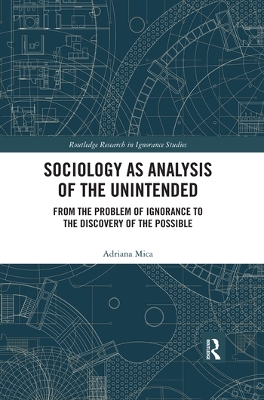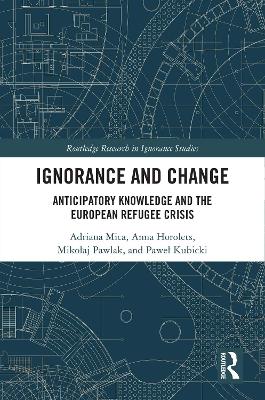Routledge Research in Ignorance Studies
2 total works
Sociology of unintended consequences is commonly depicted as a framework for understanding the outcomes that run counter to the initial intentions of social actors because of factors such as ignorance, error and complexity. This conventional approach, however, is now undergoing change under the influence of more encompassing shifts in framing in social sciences. Indeed, in the last few years, the study of the unintended has evidently moved from the question "What are the sources of the unintended?" to the inquiry "What is it that makes the unintended possible?" or "What risks, but also opportunities, do the unintended entail?"
Explaining this puzzle in relation to the internal dynamics of sociology of unintended consequences, Adriana Mica makes an erudite journey in relation to its three main analytical frameworks, their semantic shifts, setbacks and theoretical revivals. Certainly, through the examination of the use of protective headgear in boxing, this volume renders explicitly the possibilistic turn not only in the specific research of the unintended, but in sociology more generally.
Presenting the contributions of leading sociology theorists in a new light, Sociology as Analysis of the Unintended will appeal to graduate students and researchers interested in fields such as theoretical sociology, sociology of substantive issues and sociology of sport.
Ignorance and Change
by Adriana Mica, Anna Horolets, Mikolaj Pawlak, and Pawel Kubicki
Ignorance and Change analyses the European refugee crisis of 2015–2016 from the perspective of ignorance studies showing how the media, decision-makers and academics engaged in the projection and reification of the future in relation to the crisis, the asylum system, and the solutions that were proposed.
Why do recent crises fail to bring meaningful change? Why do we often see replication of the regimes of ignorance, inefficient knowledge and expertise practices? This book answers these questions by shifting the focus from the issue of change to our projections and expectations of what change will look like. Building on three comprehensive case studies, Poland, Hungary, and Romania, it demonstrates how ignorance and projectivity were essential for new Member States not only for managing the crisis but also for reaching a higher level of autonomy in relation to the EU.
Employing an innovative interactional approach to ignorance, it bridges ignorance studies with sociology of future and migration research. Challenging the dominant interest in defining ignorance, it moves the focus from what ignorance is to what ignorance does. It incorporates the concept of future into ignorance studies and develops notions such as “projective agency,” “reification of the future,” “projection by proxy,” and “projectors of EU asylum policies.” The book provides an erudite background, comprehensive empirical research, and original tools of analysis for graduate students, researchers, and policy makers interested in crisis studies, public policy, ignorance studies, social theory, migration studies, and sociology of the future.

